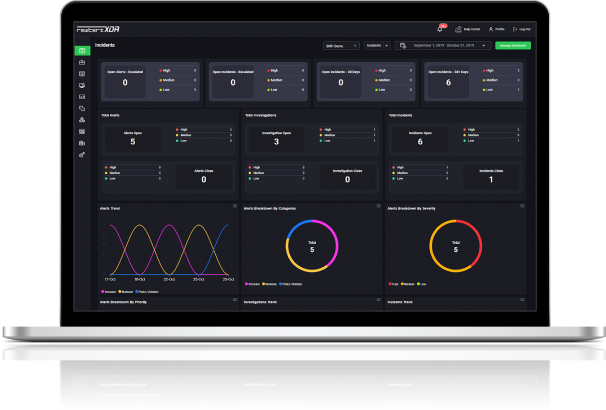

Rewterz Threat Advisory –CVE-2021-36015 – Adobe Media Encoder Information Disclosure Vulnerability
August 2, 2021
Rewterz Threat Advisory – GhostEmperor: Chinese-speaking APT Targets Southeast Asia
August 2, 2021
Rewterz Threat Advisory –CVE-2021-36015 – Adobe Media Encoder Information Disclosure Vulnerability
August 2, 2021
Rewterz Threat Advisory – GhostEmperor: Chinese-speaking APT Targets Southeast Asia
August 2, 2021Severity
High
Analysis Summary
CVE-2016-0718
Expat allows context-dependent attackers to cause a denial of service (crash) or possibly execute arbitrary code via a malformed input document, which triggers a buffer overflow.
CVE-2016-4472
The overflow protection in Expat is removed by compilers with certain optimization settings, which allows remote attackers to cause a denial of service (crash) or possibly execute arbitrary code via crafted XML data. This vulnerability exists because of an incomplete fix for CVE-2015-1283 and CVE-2015-2716
CVE-2016-5300
The XML parser in Expat does not use sufficient entropy for hash initialization, which allows context-dependent attackers to cause a denial of service (CPU consumption) via crafted identifiers in an XML document. This vulnerability exists because of an incomplete fix for CVE-2012-0876.
CVE-2017-17740
contrib/slapd-modules/nops/nops.c in OpenLDAP through 2.4.45, when both the nops module and the memberof overlay are enabled, attempts to free a buffer that was allocated on the stack, which allows remote attackers to cause a denial of service (slapd crash) via a member MODDN operation.
CVE-2017-9287
servers/slapd/back-mdb/search.c in OpenLDAP through 2.4.44 is prone to a double free vulnerability. A user with access to search the directory can crash slapd by issuing a search including the Paged Results control with a page size of 0.
CVE-2019-13057
An issue was discovered in the server in OpenLDAP before 2.4.48. When the server administrator delegates rootDN (database admin) privileges for certain databases but wants to maintain isolation (e.g., for multi-tenant deployments), slapd does not properly stop a rootDN from requesting authorization as an identity from another database during a SASL bind or with a proxyAuthz (RFC 4370) control. (It is not a common configuration to deploy a system where the server administrator and a DB administrator enjoy different levels of trust.)
CVE-2020-15719
libldap in certain third-party OpenLDAP packages has a certificate-validation flaw when the third-party package is asserting RFC6125 support. It considers CN even when there is a non-matching subjectAltName (SAN).
CVE-2019-1543
ChaCha20-Poly1305 is an AEAD cipher, and requires a unique nonce input for every encryption operation. RFC 7539 specifies that the nonce value (IV) should be 96 bits (12 bytes). OpenSSL allows a variable nonce length and front pads the nonce with 0 bytes if it is less than 12 bytes. However it also incorrectly allows a nonce to be set of up to 16 bytes. In this case only the last 12 bytes are significant and any additional leading bytes are ignored. It is a requirement of using this cipher that nonce values are unique. Messages encrypted using a reused nonce value are susceptible to serious confidentiality and integrity attacks. If an application changes the default nonce length to be longer than 12 bytes and then makes a change to the leading bytes of the nonce expecting the new value to be a new unique nonce then such an application could inadvertently encrypt messages with a reused nonce. Additionally the ignored bytes in a long nonce are not covered by the integrity guarantee of this cipher. Any application that relies on the integrity of these ignored leading bytes of a long nonce may be further affected. Any OpenSSL internal use of this cipher, including in SSL/TLS, is safe because no such use sets such a long nonce value. However user applications that use this cipher directly and set a non-default nonce length to be longer than 12 bytes may be vulnerable.
CVE-2019-1547
Normally in OpenSSL EC groups always have a co-factor present and this is used in side channel resistant code paths. However, in some cases, it is possible to construct a group using explicit parameters (instead of using a named curve). In those cases it is possible that such a group does not have the cofactor present. This can occur even where all the parameters match a known named curve. If such a curve is used then OpenSSL falls back to non-side channel resistant code paths which may result in full key recovery during an ECDSA signature operation. In order to be vulnerable an attacker would have to have the ability to time the creation of a large number of signatures where explicit parameters with no co-factor present are in use by an application using libcrypto. For the avoidance of doubt libssl is not vulnerable because explicit parameters are never used.
CVE-2019-1563
In situations where an attacker receives automated notification of the success or failure of a decryption attempt an attacker, after sending a very large number of messages to be decrypted, can recover a CMS/PKCS7 transported encryption key or decrypt any RSA encrypted message that was encrypted with the public RSA key, using a Bleichenbacher padding oracle attack. Applications are not affected if they use a certificate together with the private RSA key to the CMS_decrypt or PKCS7_decrypt functions to select the correct recipient info to decrypt.
CVE-2019-8457
SQLite3 is vulnerable to heap out-of-bound read in the rtreenode() function when handling invalid rtree tables.
CVE-2018-20346
SQLite before 3.25.3, when the FTS3 extension is enabled, encounters an integer overflow (and resultant buffer overflow) for FTS3 queries that occur after crafted changes to FTS3 shadow tables, allowing remote attackers to execute arbitrary code by leveraging the ability to run arbitrary SQL statements (such as in certain WebSQL use cases), aka Magellan.
CVE-2018-20506
SQLite before 3.25.3, when the FTS3 extension is enabled, encounters an integer overflow (and resultant buffer overflow) for FTS3 queries in a “merge” operation that occurs after crafted changes to FTS3 shadow tables, allowing remote attackers to execute arbitrary code by leveraging the ability to run arbitrary SQL statements (such as in certain WebSQL use cases).
CVE-2019-16168
In SQLite through 3.29.0, whereLoopAddBtreeIndex in sqlite3.c can crash a browser or other application because of missing validation of a sqlite_stat1 sz field, aka a “severe division by zero in the query planner.
CVE-2017-12627
In Apache Xerces-C XML Parser library processing of external DTD paths can result in a null pointer dereference under certain conditions.
Impact
- Denial of Service
- Code Execution
Affected Vendors
McAfee
Affected Products
- Policy Auditor Prior to 6.5.1
Remediation
To remediate this issue, go to the vendor’s website and download the applicable product update.








